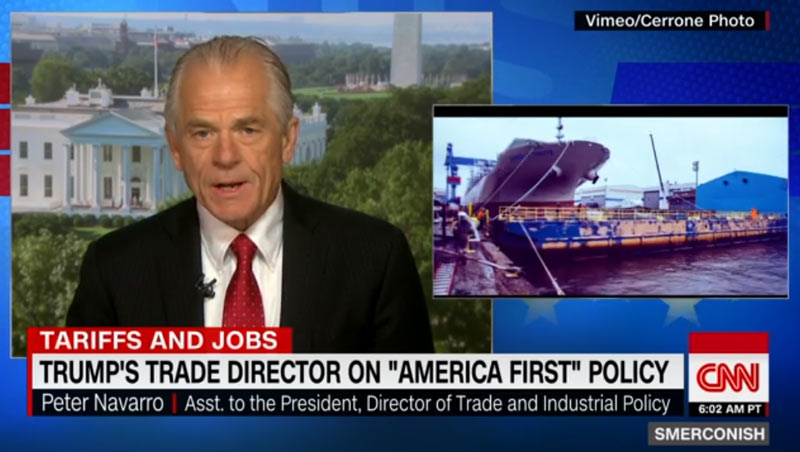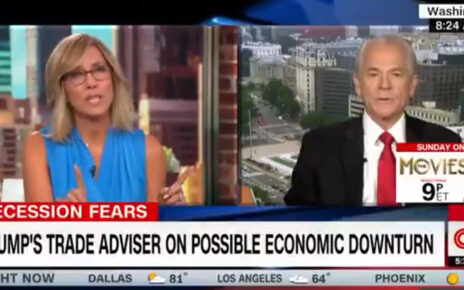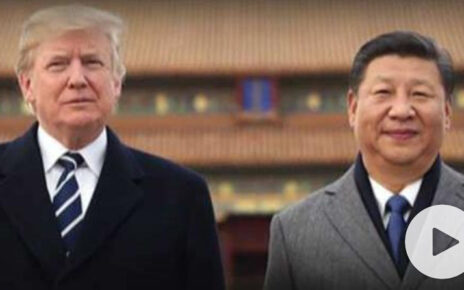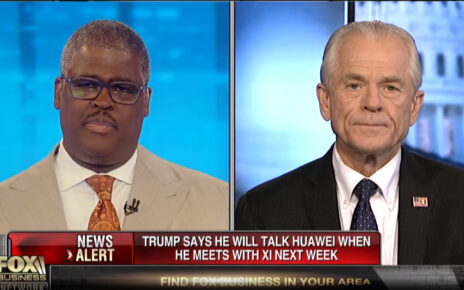June 30, 2018 – CNN, Smerconish
TRANSCRIPT
MICHAEL SMERCONISH, CNN ANCHOR: Joining me now is Peter Navarro, he’s an assistant to the President. He’s Director of Trade and Industrial Policy. He’s the Director of the White House National Trade Council. He just wrote this piece in the “Philadelphia Enquirer”: “Buying American can Help Keep the Philly Shipyard Afloat.”
Peter, we’ll begin with the good news. Talk to me about this container ship that you’ll christen in Philadelphia today.
PETER NAVARRO, DIRECTOR OF TRADE AND INDUSTRIAL POLICY: It’s going to be a great day in Philly, one of my favorite cities. Go Eagles. Eight hundred and fifty foot ship, largest container ship ever built in this country. This is good news for our shipbuilding industry.
We lost about half the amount of people that work in that industry, in an industry which pays wages at like $70,000 — $70,000 a year. This ship is being built under the two simple rules of President Trump: buy American and hire American. And the two pieces of legislation that govern this are Cargo Preference and what’s called The Jones Act.
Basically, if you have a cargo going between two points in the U.S., the U.S. requires that ship to be built, owned, and crewed by Americans and then Cargo Preference provides similar type of catalyst and this is a great day. This ship is state of the art, environmentally friendly, low cost, and what we’ve had, Michael, around the world is foreign shipyards heavily subsidizing their shipyards, dumping capacity around the world, putting Americans out of work.
And it’s kind of like a microcosm of the whole trade problem this country faces. But this ship is going to be an important part of the fleet. A sister one is coming next year, but the Philly shipyard needs some help and this Administration is trying to provide that.
SMERCONISH: So that good news comes on the same day that the lead story all across the country is one of General Motors warning that if there’s another round of tariffs, it’s going to harm investment, jobs, and wages. Respond to GM.
NAVARRO: So the history of tariffs so far in the Trump Administration. We put tariffs on solar, dishwashers, steel, and aluminum, has been a flood of new investment in this country both by domestic sources and by foreign sources which we welcome. For example, the day we announced steel and aluminum tariffs in Hawesville, Kentucky, Century Aluminum basically announced $150 million modernization and expansion.
Well, U.S. Steel announced the reopening of facilities in Granite City, Illinois. The solar industry which is just hammered by the Chinese unfair trade practices, this was an industry which we invented, is now making a strong comeback. And then we have dishwasher — everybody needs one of those, will be built more with American hands.
[09:05:00]
So GM is an American company but it is also a multinational. It likes to ship our jobs offshore. Even the GM cars that are built here, about half of the content is foreign; that doesn’t help Detroit. And so what I would urge everybody to do when multinational companies like GM issue these types of warnings, take it with about a whole can of salt.
Because, for example, the price increase in a car from GM based on the steel tariffs is about the price of a luxury floor mat. So a lot of smoke and mirrors with — with GM and others, but what we’ve seen is the Trump tariffs are working. And the bigger picture here, Michael, let’s — let’s please understand two things.
SMERCONISH: But, Peter, can I get a question in on this?
NAVARRO: Yes, sure absolutely.
SMERCONISH: It’s — it’s not just GM, right? I mean it’s Harley Davidson. I can think of no more iconic brand than Harley Davidson now exporting some of their production activities. The President tweeted — I want to put that tweet up on the screen. Here’s what your boss had to say with regard — he said “They surrendered. They quit.”
What was Harley supposed to do if the cost of bikes was going to rise by about $2,000 each?
NAVARRO: So — so Harley, I think, for America here out there he was speaking with a little forked tailpipe. For example, they closed a facility with 800 workers in Kansas City to ship that production offshore to Thailand. They love — Harley unfortunately, iconic though it may be, loves to ship their production offshore rather than build here.
And I think President Trump felt betrayed, legitimately, about this because we’ve done so much for that company including the tax bill. I mean the tax bill is at tremendous boon for corporations in a good way for American workers because what it does is it stimulates investment here and production here.
And it’s unfortunate that — that companies like GM and Harley are playing into the hands of the foreigners who basically exploit us. And the bigger picture here is that we’re — as President Trump has said, that we’re the world’s piggybank. We ship off about a half a trillion dollars every year, Michael, in the form of a trade deficit.
And that’s what we do is we transfer our wealth, our jobs, and our factories abroad and at the same time, and this is no coincidence, we have some of the lowest tariffs and lowest non-tariff barriers in the world. And all the president really wants is free, fair, reciprocal and balanced trade.
We would, prefer to have —
SMERCONISH: So here I guess is —
NAVARRO: Go ahead.
SMERCONISH: Here’s the question, I guess. The question is is whether Harley and there are many other instances, they got the advantage from the tax break. But those workers seem to get the shaft. I think what I hear–
NAVARRO: The drive shaft (ph), that is.
SMERCONISH: — Peter Navarro saying is is that the multinationals — that the multinationals don’t have the back of the workers but I think your argument is that the Trump Administration does. Is that it in short order?
NAVARRO: That’s exactly right and that’s why President Trump has the strong support of the men and women in this country who work with their hands whether it’s in the shipyards of Philly or in the factories in Detroit. I mean, the problem we have, Michael, is that a lot of our so-called factories over the last two decades have been turned into assembly plants.
You go down to South Carolina, for example, where the Germans have put a plant in that make the BMW SUV series. Well, guess what? Twenty- five percent of those — the content is U.S. while the engines are made in where? They’re made in like Bavaria, Germany and in Austria.
See, President Trump thinks that what we need to do is have more production here, have us have a strong manufacturing in defense and industrial base, and as the President has said is economic security is national security. And that’s why, for example, today the shipyard is so important. It’s not just that we have —
SMERCONISH: I got it.
NAVARRO: — a shipyard, but it’s that we have a — a military that we can — that we can to defend ourselves and all of our allies, by the way, who are basically taking us to the cleaners on the trade deficit.
SMERCONISH: OK, I want — I want to ask a three parter but you can handle it.
NAVARRO: Oh — I don’t have any notes here but I’ll give it a try here —
SMERCONISH: On the WTO (ph) — all right, here we go. Axios (ph) said yesterday that the President is often heard to say that we get “effed” by the World Trade Organization. Three part question — first of all, do we? Secondly–
NAVARRO: Yes.
SMERCONISH: — has he said that to you? Well, we’ll take them one at a time. Do we get “effed” by the WTO?
NAVARRO: Yes. Here’s the problem.
SMERCONISH: Well, yes or no? No, I want to go through them —
NAVARRO: Absolutely.
SMERCONISH: — I want to go through all three.
NAVARRO: Absolutely. The World Trade Organization has–
SMERCONISH: OK, number two —
NAVARRO: –rules —
SMERCONISH: –number two, has he said that — NAVARRO: –not in favor with the United States.
SMERCONISH: Has he — has he said that to you?
NAVARRO: What he says to me in the Oval or the Roosevelt Room is between me and the President. What he has said publically is–
SMERCONISH: All right.
NAVARRO: — that the World Trade Organization has a set of rules which disadvantaged this country and contribute to unfair trade and — and instability in the global trading order because of that.
SMERCONISH: All right, number three. Are we getting out?
NAVARRO: That’s the President’s decision. What we are trying to do with the World Trade Organization is basically get that organization to a place where we have free, fair, reciprocal, and balanced trade. I’ll give you an example. Under the rules of the WTO, right now, we charge 2.5% tariffs on automobiles coming in from Germany or from China.
Well guess what? China can charge 25% and Germany can charge 10% tariff. Now how is that fair? But that’s the rule of the World Trade Organization, so what — all we’re trying to do, basically, is to bring about a — a restructuring of the global trading order which is actually good for free trade because it will lead to fair, balanced, reciprocal trade.
We would — we would love zero tariffs. Zero non-tariff barriers, zero subsidies, zero currency manipulation, these are the kind of things that plague this trading system and Americans —
SMERCONISH: Peter–
NAVARRO: — know what — what’s happened over the last 15 years. It’s not been pretty.
SMERCONISH: One more, quickly, if I can. Now it’s Canada — ketchup, yogurt, whiskey, lawn mowers, motor boats. I guess my final question is — is this. You know, is this what winning looks like when we’re at odds — our government, with GM, with Harley Davidson, with our neighbors to the north.
I mean, apple pie seems to be the only thing on the list right now that — that you’re not fighting over trade. Respond.
NAVARRO: Here’s what winning looks like. A 4% GDP growth rate, the lowest unemployment for blacks and Hispanics in history — historically low unemployment rates, wages rising, productivity rising, and investment flooding into this country because of the Trump trade policy.
So we are going to move forward with that. The President has a sound strategy and in terms of — of Canada and Mexico, what we need to do next with them is simply negotiate a fair NAFTA deal for this — for this country. And for example, with Mexico, a NAFTA deal with Mexico would be tremendously beneficial for both countries.
If we could regain the supply chain between these two countries for this hemisphere, that’d be a great deal.
SMERCONISH: I — I understand we’re getting flooded with social media reaction. Before you go, Kathryn (ph), put one up on the screen so that Peter has the opportunity to respond with me. Just give us a taste of what’s — what’s come in.
“Smerconish, how is losing your job going to be good for the American worker because that is the result of Trump’s trade policy? Look at Harley and soon GM.”
You want to respond to that gentleman, Peter?
NAVARRO: Sure, it’s counterfactual. You just look at the data. We have the lowest unemployment rates we’ve had for a very long time. There’s been 7 quarters, Michael, where the unemployment rate has been below 4% since the 1970s. And guess what? The last two quarters were below 4%.
The lowest unemployment — and the President is very proud of this. The lowest unemployment rates for blacks and Hispanics in history and part of that is because of the trade policy. What we’ve had is just this flood of foreign goods and effectively dumping of cheap, slave labor on the global markets.
The President says that’s not the way free trade is supposed to be. So this President is getting the job done. The trade policy is resulting in more investment in this country. Its working perfectly, we’re going to stay the course, and Donald J. Trump is visionary. He’s willing to do what the past presidents over the last 20 years have been not only unwilling to do but have gotten us into the mess with NAFTA and China and the WTO and the bad Korean deal and all of that.
We’re turning that around and–
SMERCONISH: OK.
NAVARRO: –and its all President Donald J. Trump.
SMERCONISH: Give him another one, quickly if we can. I know we’re way over, but one more Kathryn (ph). What do we got?
“Smerconish, policy? What policy? You mean Twitter rants to which his staffers must respond and make into some semblance of policy.” Hey, Barth (ph), asks a — a good point. Is there some coherence to all of this, Peter? Because from the sidelines, a lot of it does seem to be seat of the pants. Quick response, if you don’t mind.
NAVARRO: Free, fair, balanced, reciprocal trade. That’s all we want. When we encounter anything other than that, the President responds with strong trade policy which are designed to stimulate investment here to put facilities here that make things so that men and women in this country can have good jobs and good wages. It’s working perfectly, just look at the numbers.
SMERCONISH: Peter Navarro, thank you for being here.
NAVARRO: I look forward to being in Philly today. I wish you could come down to the shipyard and take a bottle of champagne and hit that thing.
SMERCONISH: It’s hot. I’ll take the champagne, believe me. Thank you Peter. Peter inspired today’s poll question at smerconish.com.




